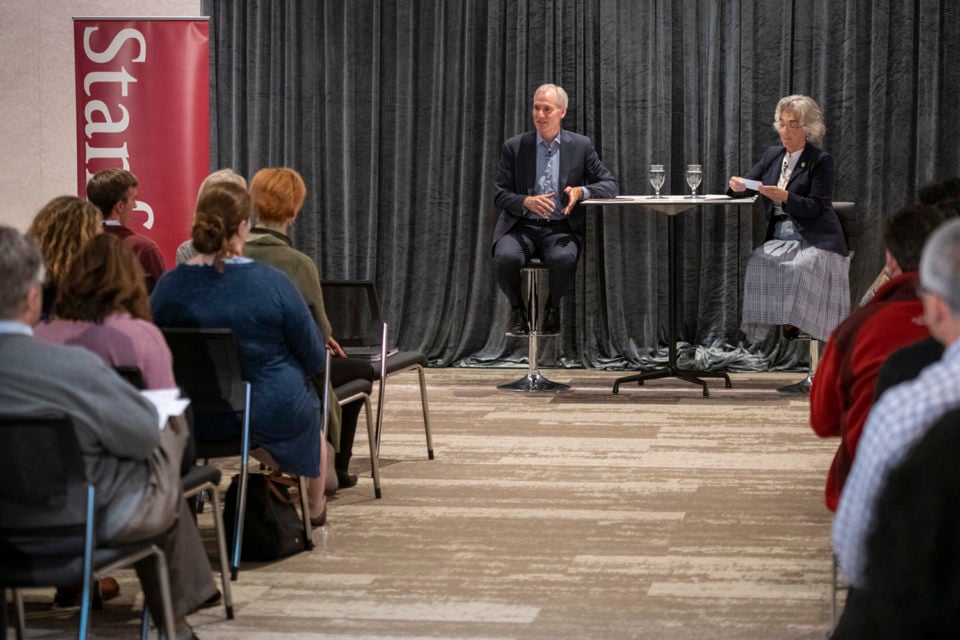In their first community conversation at Stanford Redwood City on Tuesday, University President Marc Tessier-Lavigne and Provost Persis Drell provided updates on their long-range planning initiatives, including information regarding the General Use Permit (GUP) and ongoing budgeting and affordability measures. The discussion was followed by questions from the community.
The meeting, which drew approximately 125 members of the Stanford community to Cardinal Hall on the new Redwood City campus, began with remarks from the President applauding a smooth transition to the new campus. Tessier-Lavigne expressed his gratitude for the 1,100 employees who have relocated thus far, half of the employees that are set to eventually relocate. The full schedule for the relocation can be found on the Cardinal at Work website.
The Redwood City campus will eventually be home to many of Stanford’s administrative departments, including three of the university’s eight vice presidents. Tessier-Lavigne also emphasized the commitment of the leaders and staff of Land, Buildings & Real Estate, University Human Resources, University IT, Residential & Dining Enterprises and other groups.
“We are deeply grateful for how you have embraced this major change for our university and also for the ways you have brought Stanford to life here in Redwood City,” he said. “You collaboration, your optimism and your flexibility are already shaping this new campus.”
Tessier-Lavigne provided updates regarding Stanford’s application for a renewal of its GUP, and the Permit’s relation to the ongoing move to Redwood City.
If approved, Stanford’s GUP will authorize University owned land and facility expansion through 2035. It also addresses Stanford’s relationship to the area, aiming to support the needs of the Stanford community and the wider region.
In response to recent coverage claiming the GUP process is stalled or that Stanford is withdrawing from particular parts of the process such as a conditional mitigation agreement with Palo Alto Unified School District, Tessier-Lavigne assured community members that the University had “asked the County to slow down” amidst concerns over a portion of the review process but was nevertheless moving forward with negotiations.
In addition to improving facilities and services for the Stanford community, the Permit negotiations address funding programs for housing affordability. Drell noted that over half of the capital budget is being dedicated to housing.
“Affordability is one of the biggest challenges we face as an institution,” she said. “It’s a huge issue for us and … the entire Bay Area.”
Discussing the 2019-20 budget, Drell admitted it was a “tight budget year” but outlined the University’s strategy on what areas to prioritize for funding. The two major themes revolved around addressing both current pressing needs of the campus community and investing in long-term priorities in alignment with Stanford long-range vision.
Current needs include the aforementioned access to affordable housing, in addition to student mental health resources and faculty diversity initiatives.
During the Questions from the Community session, attendees addressed the issue of campus engagement and outreach. Tessier-Lavigne emphasized the necessity of connectivity between campuses, both through technology such as live streaming, and physical presence through town halls and meetings.
Drell added that Tuesday’s community conference comes after nearly a year of significant outreach by the task force, which has initiated university-wide programming that address five key stakeholder groups: faculty, academic staff, staff, postdoctoral scholars and graduate students. Drell cited that so far, 14,000 people have participated in the assessments.
Tessier-Lavigne and other University leaders plan to share more details on the upcoming steps for the implementation of the strategic initiatives discussed at the annual Academic Council meeting on Thursday.
Contact Brooke Beyer at bbeyer ‘at’ stanford.edu.
